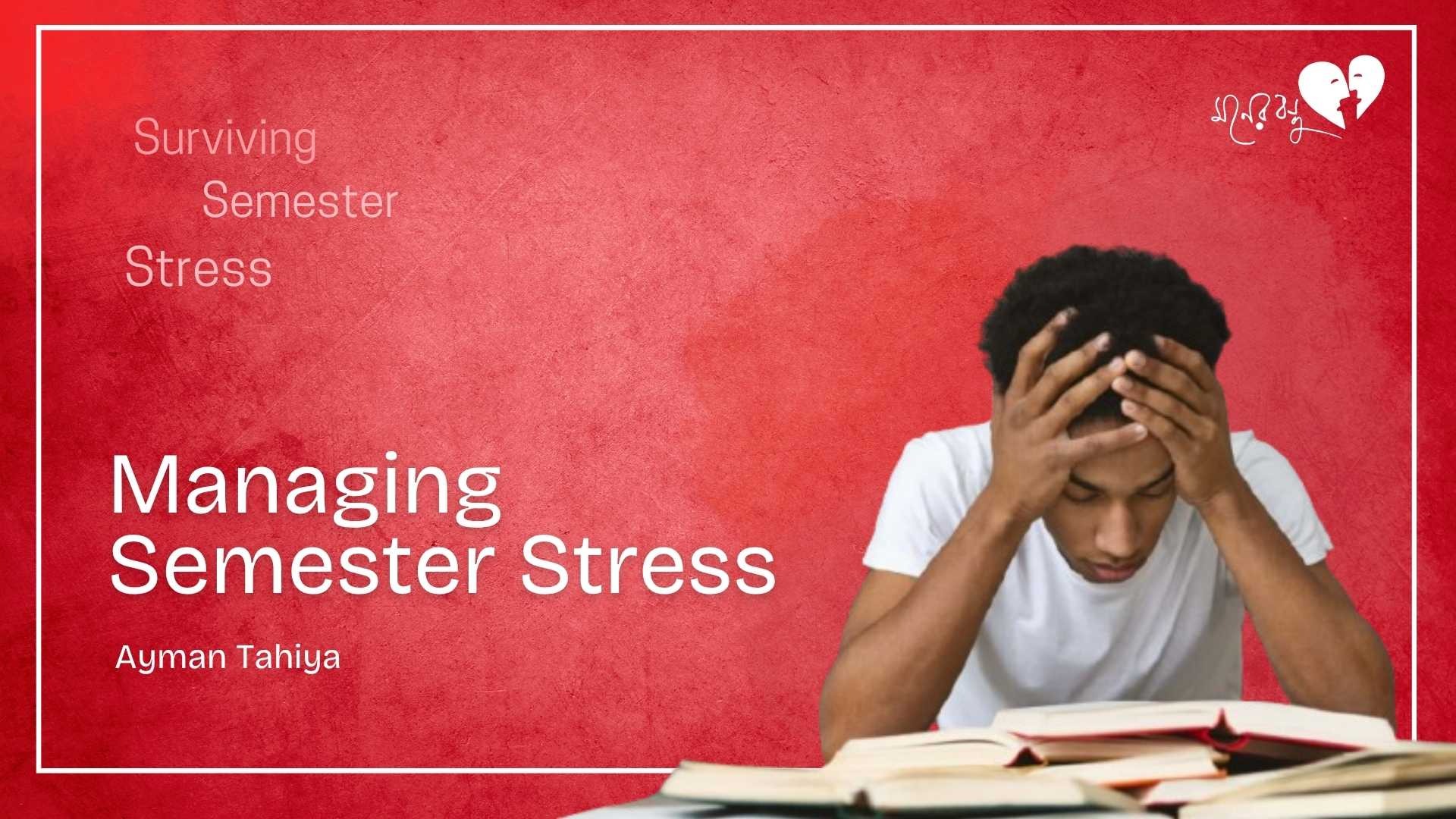
Ayman Tahiya
The start of every semester is filled with fresh energy - new classes, new notebooks, and a sense of possibility. But as deadlines grow closer, that excitement can turn into anxiety. Late nights, upcoming exams, and the fear of falling behind can make simple tasks feel heavy. A calendar can help organize your time, but it cannot ease the emotional weight. If left unchecked, that stress can leave you drained and disconnected.
Academic stress feels different. It’s not just a busy schedule — it’s about what those grades seem to represent: your future, your worth, your identity. Your body reacts to school stress as if it were a physical threat, staying alert and tense. Stress can motivate in small doses, but when it builds up, focus and memory begin to slip just when you need them most.

The first step is awareness. Notice the quiet signals: a tight jaw, sleepless nights, irritability, or avoidance of important tasks. These are not weaknesses. They are reminders that your system is asking for rest. Listening to them can prevent burnout before it arrives.
Big efforts are not always the answer. Steady, small actions matter more:
Make space for breaks, meals, and rest.
Divide large tasks into smaller goals with their own deadlines.
Use planners, apps, or sticky notes to keep things clear.
Move your body. Even a ten-minute walk between classes can reset your focus.
Protect your sleep; seven hours gives your mind time to recover and rebuild.
Stress grows in isolation. Sharing it lightens the load. Talk to a friend, classmate, or family member. Join a study group so the challenge becomes shared, not solitary. Remember that counseling services and mental health hotlines exist for this very reason. Reaching out is not weakness, it’s wisdom.
Grades matter, but they are not your entire story:
When you fall behind, replace “I’m failing” with “I’m learning what I need to improve.”
Kind self-talk transforms pressure into perspective.
Each semester is a chapter, not your whole book.
Stress thrives on constant movement. Create small pauses in your day. Five deep breaths before you open your laptop, a short stretch between readings, a few lines in your journal at night. These moments are not wasted time. They are a time to recharge.
Repeated daily, they teach your body to recover faster.
The key to surviving semester stress is not about perfection, but more about balance. You are not a machine, you are a person who is learning and growing. Each step is a step towards the positive. Each, and every deadline will pass, every exam will end, and the skills you build to manage your stress will stay with you for a long time. Breathe, and plan. You can handle a lot more than what the pressure is making you feel.
ব্লগটি মনের বন্ধু এক্সপার্ট দ্বারা রিভিউয়ের পরে প্রকাশিত
এই ব্লগের একমাত্র উদ্দেশ্য মানসিক স্বাস্থ্য বিষয়ক সচেতনতা বৃদ্ধি করা। পাঠকের বোঝার সুবিধার্থে এতে কিছু প্রতীকি ঘটনা ব্যবহার করা হয়েছে।
এই ব্লগ বা এর কোনো অংশ পড়ে কেউ আঘাতপ্রাপ্ত হলে তার জন্য লেখক ও ‘মনের বন্ধু’ দায়ী নয়। মনের ওপর চাপ অনুভব করলে বা মানসিকভাবে ট্রিগার্ড অনুভব করলে দ্রুত মনের বন্ধু বা যেকোনো মানসিক স্বাস্থ্যবিদের সাথে যোগাযোগ করুন।
মনের বন্ধুতে কাউন্সেলিং নিতে যোগাযোগ করুন: ০১৭৭৬৬৩২৩৪৪।
📍: ৮ম ও ৯ম তলা, ২/১৬, ব্লক-বি, লালমাটিয়া, ঢাকা

Mental stress is our emotional and psychological response when we feel overwhelmed, pressured, or threatened by challenging situations.

Though the era has moved on, the society of our country is still dark. I am saying this because almost all families in our country think “What is mental health again? What is depression?

In the bustling streets of Bangladesh, amidst the vibrant culture and rich traditions, lies a silent struggle that often goes unnoticed—the mental health challenges faced by Bangladeshi men. While the

ঘটনা ১ঃ দীর্ঘদিন সেমিস্টার ব্রেকের পর আবার ক্লাস শুরু হবে শায়লার (ছদ্মনাম)। ছুটিটা বেশ আনন্দেই কাটিয়েছে। কিন্তু বিপত্তি বাঁধলো ছুটির শেষ দিকে এসে। এক প্রবল অস্থিরতা পেয়ে বসলো তাকে। বিশ্ববিদ্যালয়, ক্লা